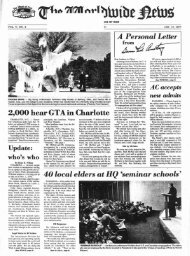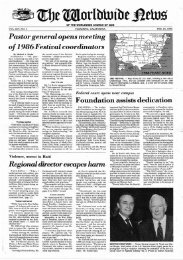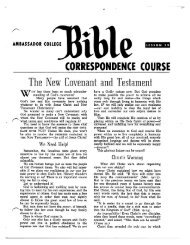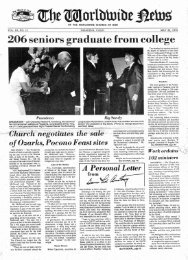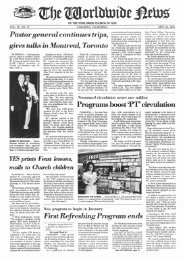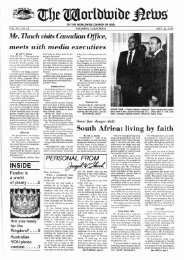Plain Truth 1978 (Prelim No 04) Apr - Herbert W. Armstrong
Plain Truth 1978 (Prelim No 04) Apr - Herbert W. Armstrong
Plain Truth 1978 (Prelim No 04) Apr - Herbert W. Armstrong
Create successful ePaper yourself
Turn your PDF publications into a flip-book with our unique Google optimized e-Paper software.
HOW TO HELP<br />
YOUR<br />
CHILD SUCCEED<br />
Want to improve your child's performance in school? Some noted researchers offer<br />
a few suggestions for developing your child's human potential.<br />
Aa ny given moment<br />
somewhere<br />
on this globe a<br />
proud parent is effusively<br />
exclaiming, "That's<br />
my kid!" Whether it's<br />
the joy of a baby's first<br />
step, a daughter's first<br />
ballet performance, or a<br />
new promotion for a 35year-old<br />
"baby," it's<br />
wonderful when children<br />
do something to cause<br />
parents such pleasure.<br />
Parents want their<br />
children to be successful,<br />
happy, and well adjusted.<br />
Some parents<br />
even go to great lengths<br />
to turn their children<br />
into prodigies, geniuses,<br />
or wunderkinder. But<br />
many mothers and<br />
fathers may not realize<br />
that they can do a lot<br />
more toward developing<br />
such traits. Recent studies have revealed<br />
the sobering fact that parents<br />
play an incredibly important role in<br />
the total development of their children.<br />
That role appears to be<br />
doubly important during a vital ten <br />
month period early in a toddler's<br />
life.<br />
Importance of Parental Contact<br />
Professor Robert Zajonc and his colleague<br />
Dr. Gregory Markus, two<br />
University of Michigan researchers,<br />
have concluded that adult contact is<br />
30<br />
by Robert D. Oberlander<br />
a significant factor in the development<br />
of the intellectual ability of<br />
children. Their research found that<br />
the child's rate of mental development<br />
was related to the amount<br />
of adult knowledge available to the<br />
child. In order to increase both the<br />
parental contact and the knowledge<br />
available to the child, both necessary<br />
for greater intellectual growth.<br />
children should be spaced at least<br />
three years apart. Their research<br />
shows more rapid growth in intellectual<br />
skills when the parental<br />
knowledge is not shared<br />
by two or more children.<br />
Recently there has<br />
been a growing concern<br />
over a drop in scores of<br />
high school graduates<br />
taking the Scholastic Aptitude<br />
Test. Zajonc and<br />
Markus cite ' the baby<br />
boom of the 1940s and<br />
1950s as a possible cause<br />
in these declining scores.<br />
Then, parents had more<br />
children and spaced<br />
them relatively close together.<br />
The researchers<br />
feel the decline in performance<br />
will reverse as we<br />
move into the 1980s and<br />
see the reflection of<br />
fewer children per family<br />
with more time separating<br />
them.<br />
Swiss psychologist<br />
Jean Pia get for many<br />
Candida Photo years has researched the<br />
area of intellectual development.<br />
His work has reflected the "active<br />
and creative nature of children's<br />
thinking" from birth forward. Piaget's<br />
theories have lent themselves<br />
to further investigation in this important<br />
area.<br />
In 1965 psychologist Burton L.<br />
White started a research operation<br />
called the Harvard Preschool<br />
Project. At that time, scientists were<br />
just beginning to realize that intellectual<br />
development started before<br />
school age . Dr. Benjamin S.<br />
The PLAIN TRUTH . <strong>Apr</strong>il <strong>1978</strong>







